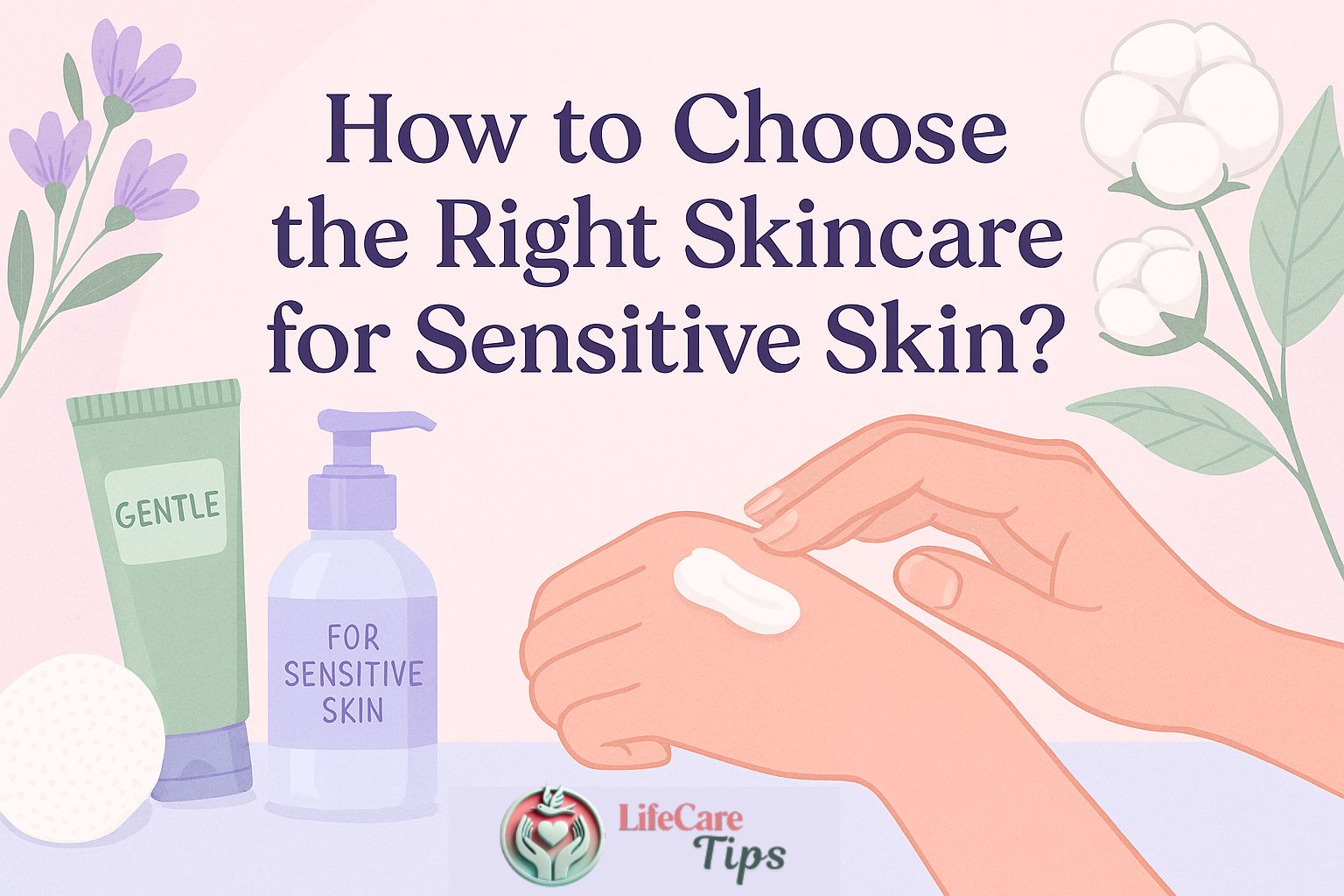Stick to soothing, fragrance-free skincare, hydrate often, and avoid anything with harsh or irritating ingredients.
Tired of your skin flaring up at the slightest change in weather or product? You’re not alone. With sensitive skin, even small missteps can lead to redness or dryness. That’s why skincare for sensitive skin is more about relief than routine. Whether you’re newly noticing these changes or have been struggling for years, this guide is here to help you feel seen, supported and understood.
What is sensitive skin?
Compared to other types, sensitive skin is easily irritated. It’s not a diagnosis it’s a skin condition where your skin overreacts to triggers like certain ingredients, weather, or even stress. This reaction happens because your skin barrier the layer that protects your skin is compromised or naturally more delicate.
💠Common signs you may have sensitive skin:
- Redness or blotchiness
- Burning, itching, or stinging after applying products
- Flaky, dry, or tight skin
- Breakouts from mild formulations
Tip: Not sure if it’s dry skin or truly sensitive? Dry skin lacks moisture, while sensitive skin reacts. Many people experience dry sensitive skin, which makes it even more important to use hydrating yet non-irritating products.
Why is choosing the right skincare so important for sensitive skin?
Sensitive skin has a weaker barrier, making it prone to irritation and dehydration. The right skincare routine supports and strengthens your skin’s natural defenses. When the skin barrier is weak, even water may cause discomfort. Using the wrong products can worsen sensitivity over time. But with the right skin care for sensitive skin, you can:
- Minimizes flare-ups
- Keeps the skin hydrated
- Reduces redness and reactivity
- Helps maintain a healthy skin barrier
📌Get personalized skincare insights at LifeCare Tips. Start taking care of your skin now!

How to build the best skincare routine for sensitive skin?
The goal isn’t to load up on products, it’s to choose a few that calm, hydrate, and protect without triggering reactions. Start with a minimal, fragrance-free routine: a gentle cleanser, soothing moisturizer, and SPF.
👉Step-by-Step Sensitive Skin Care Routine:
- Cleanser: Choose a soap-free, fragrance-free cleanser. Pick items marked “suitable for sensitive skin” or “won’t clog pores.”
- Moisturizer: Opt for barrier-repairing ingredients like ceramides, hyaluronic acid, or squalane.
- Sunscreen: Physical sunscreens (with zinc oxide or titanium dioxide) are less irritating than chemical ones.
- Extras (Optional): If your skin allows, add soothing serums with niacinamide or Centella Asiatica but go slow.
💡 Keep your skincare routine for sensitive skin simple—less is more.
Which ingredients should you avoid if you have sensitive skin?
Dryness often goes hand-in-hand with sensitivity. That’s why your skin needs both moisture and protection. Avoid alcohol, artificial fragrance, essential oils, sulfates, and harsh exfoliants, these can trigger irritation or worsen sensitivity.
✅Common Irritants to Watch Out For:
| Avoid This | Why It’s Harmful for Sensitive Skin |
| Fragrance/Perfume | Causes allergic reactions, redness |
| Alcohol (denat.) | Strips natural oils, causing dryness |
| Sulfates (SLS/SLES) | Harsh cleansers that damage the skin barrier |
| Retinoids & AHA/BHA | May cause burning or peeling in sensitive types |
| Essential oils | Natural, but still potential allergens |
⚠️Always read labels and do a patch test behind your ear or jawline for 24 hours before full application.
Can all skin types be sensitive?
Yes, you can have oily or dry skin and still experience sensitivity as it’s not limited to one type. That’s why tailoring your sensitive skin care routine to both your skin type and sensitivity is key.
| Skin Type | Sensitive Skin Tip |
| Oily | Use gel-based, non-comedogenic moisturizers |
| Dry | Go for rich creams with ceramides and shea butter |
| Acne-prone | Avoid benzoyl peroxide; try azelaic acid instead |
| Combination | Balance hydration in dry zones, avoid actives |
You might like: What are the types of skin, and how do they differ?
Can I treat other skin issues with sensitive skin?
Yes, but it requires balance. Many people with dry sensitive skin also face acne, dark spots, or dullness. The key is choosing sensitive skin treatment options that don’t trigger irritation.
Tips:
- Use fragrance-free acne gels with low-dose salicylic acid.
- Try niacinamide for brightening and strengthening the skin barrier.
- Avoid combining too many actives (like vitamin C, exfoliants, and retinol) at once.
When to see a dermatologist?
If your skin reacts frequently, flares up without a clear cause, or over-the-counter sensitive skin treatment doesn’t help, it’s best to consult a dermatologist.
A professional can:
- Identify triggers (allergies, skin conditions).
- Prescribe medicated sensitive skin treatment.
- Suggest a safe, tailored skincare routine.
The Bottom Line
Sensitive skin isn’t a flaw, it just asks for a little extra care. With the right routine, gentle ingredients, and mindful choices, your skin can feel calmer and healthier day by day. From identifying triggers to choosing what truly suits your skin type, every small step adds up. Think of it as building trust with your skin—one product, one habit, one moment at a time. Find the perfect skincare routine for you at LifeCare Tips. Start your journey today!
FAQ’s
1. What is the best skin routine for sensitive skin?
The best skincare routine for sensitive skin includes gentle cleansers, soothing moisturizers, sunscreen, and minimal exfoliation. Choose fragrance-free and hypoallergenic products.
2. What do dermatologists recommend for sensitive skin?
Dermatologists suggests using gentle, fragrance-free products that won’t clog pores or trigger allergies. These help minimize irritation and avoid harsh chemicals, alcohol, and fragrances.
3. Is sensitive skin dry or oily?
Sensitive skin isn’t necessarily dry or oily. It’s a condition where skin reacts easily to irritants, and it can happen with any skin type.
4. Is hyaluronic acid good for sensitive skin?
Yes, hyaluronic acid is safe for sensitive skin. It hydrates and soothes without irritation, making it a gentle option for conditions like eczema or rosacea.
5. What’s best for sensitive skin?
For sensitive skin, opt for fragrance-free, gentle products. Keep showers short, avoid harsh scrubs, and moisturize regularly to protect and soothe your skin.

Hi, I’m Tisha Verma—a content writer with a passion for skincare and wellness. Through LifeCareTips, I share simple, practical, and reliable skincare tips, DIY remedies, and insights that truly work. My focus is on delivering honest, research-backed advice to help you care for your skin naturally. Whether it’s tried-and-tested home remedies or thoughtful reviews, I’m here to share what genuinely makes a difference—so you can make informed choices with confidence.


1 thought on “How to Choose the Right Skincare for Sensitive Skin?”
Comments are closed.